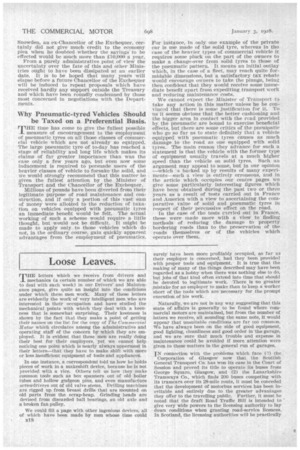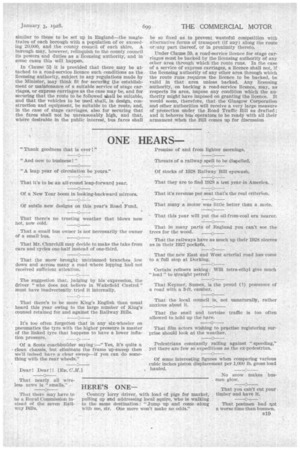Loose Leaves.
Page 36

Page 37

If you've noticed an error in this article please click here to report it so we can fix it.
THE letters which we receive from drivers and mechanics (a certain number of which we are able to deal with each week) in our Drivers' and Maintenance pages, give quite an insight into the conditions under which these men work. Many of these letters are evidently the work of very intelligent men who are interested in their occupation and have studied the mechanical points with which they deal with a keenness that is somewhat surprising. Their keenness is shown by the fact that they make a point of getting their names on the list for the copy of The (f mercia 1 Motor which circulates arhong the administrative and operating staff of the concern by which they are employed. It is evident that these men are really doing their best for their employers, yet we cannot help noticing one point which is nearly always uppermost in their letters—that they have to make shift with more or less insufficient equipment of tools and appliances.
In one instance, a correspondent told us how he holds pieces of work in a makeshift device, because he is not provided with a vice. Others tell us how they make common tools such as box spanners out of old boiler tubes and hollow gudgeon pins, and even Manufacture screwdrivers out of old valve stems. Drilling machines are rigged up from Breast drills that are mounted on old parts from the scrap-heap. Grinding heads are devised from discarded ball bearings, an old axle and a broken fan pulley.
We could fill a page with other ingenious devices, all of which have been made by men whose time could B18 surely have been more profitably occupied, so far as their employer is concerned, had they been provided with proper tools and equipment. It is true that the making of many of the things described may have been regarded as a hobby when there was nothing else to do, hut jobs of that kind often extend into time that should he devoted to legitimate work. There is no greater mistake for an employer to make than toleep a Worker short of the tools which are necessary for the prompt execution of his work.
Naturally, we are not in any way suggesting that this state of affairs is generally to be found where commercial motors are maintained, but from the number of letters we receive, all sounding the same note, it would appear that unsuitable conditions are far too common. We have always been on the side of good equipment, good lighting, cleanliness and good order in the garage, and we are sure that much trouble and expense in maintenance could be avoided if more attention were given to these matters in the general run of garages.
TN connection with the problems which face (1) the Corporation of Glasgow now that the Scottish General Transport Co. has won its ease in the Court of Session and proved its title to operate its buses from George Square, Glasgow, and (2) the Lanarkshire Tramways Co., which finds 200 buses competing with its tramcars over its 28-mile route, it must be conceded that the development of motorbus services has been inevitable and entirely due to the greater advantages they offer to the travelling public. Further, it must be noted that the draft Road Traffic Bill is intended to give very wide powers to the licensing authority to lay down conditions when granting road-service licences. In Scotland, the licensing authorities will be practically
similar to those to be set up in England—the magistrates of each borough with a population of or exceeding 20,000, and the county council of each shire. A borough may, however, relinquish to the county council its powers and duties as a licensing authority, and in some cases this will happen, In Clause 53 it is provided that there may be attached to a road-service licence such conditions as the licensing authority, subject to any regulations made by the Minister, may think fit for securing the establishment or maintenance of a suitable service of stage carriages, or express carriages as the case may be, and for securing that the route to be followed shall be suitable, and that the vehicles to be used shall, in design, construction and equipment, be suitable to the route, and, in the case of stage carriages, also for securing that the fares shall not be unreasonably high, and that, where desirable in the public interest, bus fares shall be so fixed as to prevent wasteful competition with alternative forms of transport (if any) along the route oriany part thereof, or in proximity thereto.
Under Clause 50, a road-service licence for stage carriages must be backed by the licensing authority of any other area through which the route runs. In the case of a service of express carriages, a licence shall not, if the licensing authority of any other area through which the route runs requires the licence to be backed, be valid in that area unless backed. Any licensing authority, on backing a road-service licence, may, as respects its area, impose any condition which the authority might have imposed on granting the licence. It would seem, therefore, that the Glasgow Corporation and other authorities will receive a very large measure of protection under the Road Traffic Bill as drafted ; and it behoves bus operators to be ready with all their armament what the Bill comes up for discussion




































































































